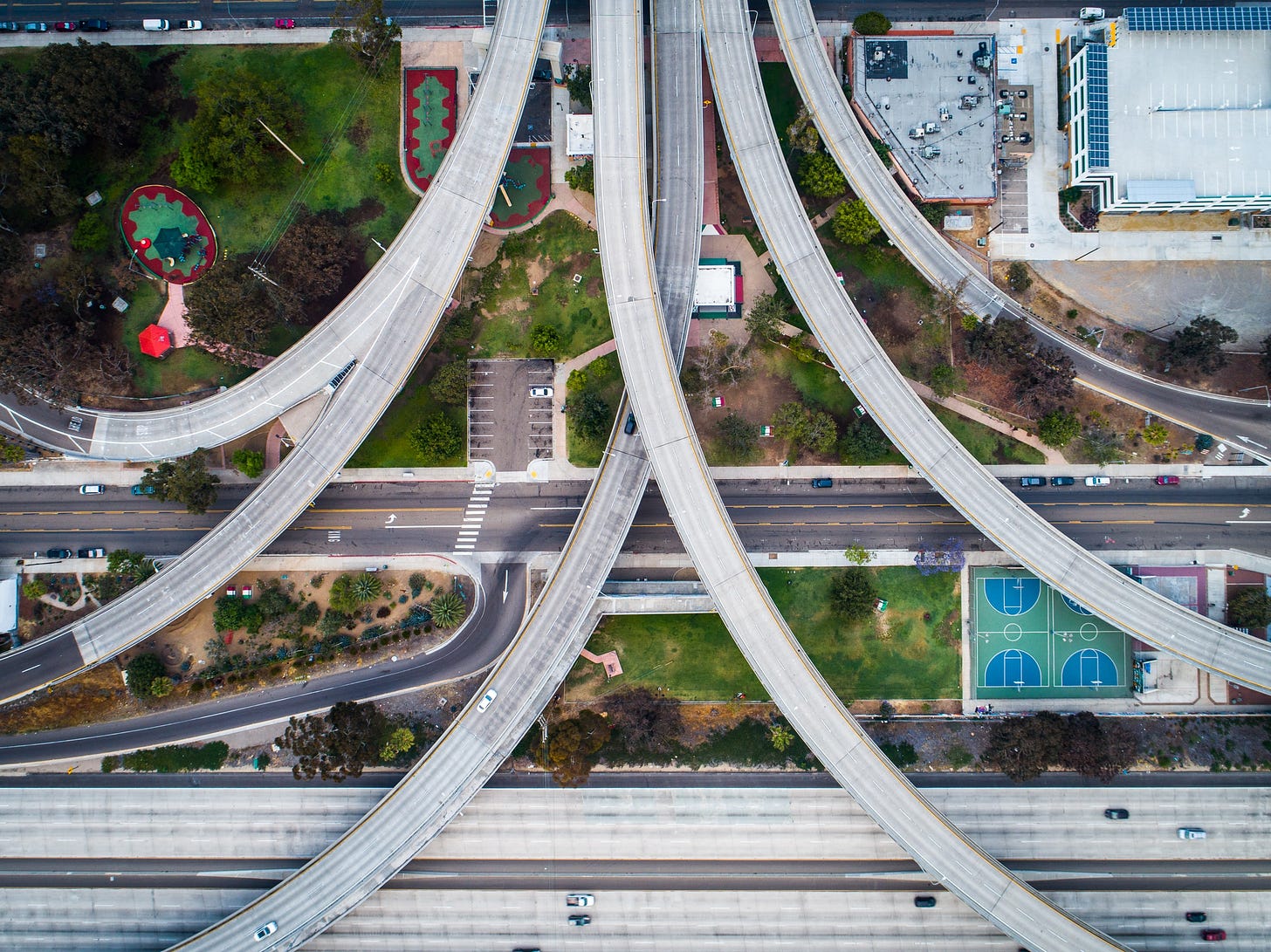How Government Roadbuilding Killed Innovation in Transportation

For thousands of years, the main way people traveled was by foot or horse, restricted to low speeds along rough paths across the land. The wave of innovations that followed the industrial revolution changed all that. In the eighteenth century, new canals enabled heavy freight to be moved more easily. In the nineteenth century, railways enabled the movement of larger numbers of people and heavier freight, at much higher speeds. Then came oil-powered vehicles such as trucks and cars, enabling point-to-point private transportation, reaching places away from the rail network. At the start of the twentieth century, the Wright Brothers invented the aeroplane, which made long-distance travel faster than ever before, especially once jet-powered airliners followed in the 1940s.
Then something changed. Almost eighty years have passed since the end of WWII, and yet we are still using the same dominant modes of transportation we were using in 1945. When J. Storrs Hall asked “Where Is My Flying Car?” he shone a light on an important, but often-overlooked fact: There have been no major innovations in transportation since the jet engine.
What changed? In short, the government took sides in the competition between modes of transportation. Following a model established by Nazi Germany with its Autobahn system, Western governments piled billions upon billions into new national highway systems in the mid-20th century.
Previously, in freer countries such as Britain and the U.S., private companies had built railways and canals based on predictions of profitable traffic. Some availed of government power in obtaining land, and governments sometimes directed where routes could and couldn’t go, but the main driving force was anticipated demand. Conversely, the new government-planned road networks could go wherever the politicians wanted them. They did not need to prove their worth in future revenue. Governments used their power to appropriate property, tearing through poor inner-city districts and cutting across the countryside, destroying homes and businesses. The cost of construction was enormous—the estimated bill for the main Interstate Highway System in the U.S. was $535 billion in 2020 dollars.
The result was a distortion of the market. A first-class road network now existed that simply would not have been there through natural market forces. Any car owner or bus operator could use it. At the same time, governments built airports whether there was an economic case for them or not, which any airline could use.
The result has been a massive disincentivization of further innovation. Why invent a new type of high-speed railway when there’s a fast road to every city? Why invent a new kind of local air travel (or, for that matter, a flying car) when five-lane highways go right into the centers of the cities? Why invent ways to make airports faster, more customer-friendly, and easier to get to, when the government airports get funded regardless and airlines have no realistic alternative but to use them?
It is bittersweet to imagine the kind of world we could have by now if governments had stayed out of the transportation industry. Imagine privately run bullet trains linking cities in a fraction of the driving time, a flying car on every roof, and helicopter shuttles from the heart of downtown to the airport tarmac for seamless transfer to the plane. One can imagine getting off the helicopter shuttle to board a supersonic jet that’ll cross the ocean in an hour, with no time-consuming waiting at the terminal and no brusque, offensive government-employed security agents.
This is the world governments stole from us. Is it too late to get it back?
Privatizing road networks immediately would be an excellent start. Right now, transport planners are engaged in a fierce debate over whether the government should be pro- or anti-cars, and pro- or anti-trains. It should be none of these. Private roads would benefit everyone. Where there is sufficient demand, road operators would create new kinds of roads designed to be faster and safer than any road today, yet cheaper to use than the cost of the various taxes governments currently extort from motorists. Where there isn’t enough demand, roads would close, letting rail lines, dedicated busways, or other novel solutions take over.
Maybe, an opponent of privatization might fear, road operators would decide that their roads would make more money as development land, close them all down, and cover them with housing. Why not? All that would do is drive up the incentive for somebody to invent or provide a better way of getting from A to B… not to mention a ton of new places for people to live, all built on previously developed land.
Whenever governments interfere with markets, the result is less innovation and poorer services. Unlike a private company, the government can use the law to force through its ideas. A private company has to respond to the reality of what people need. If we want to get back to innovating new ways for people to get around, and realize all the benefits that could have for people’s quality of life, it’s long past time to privatize the roads.


